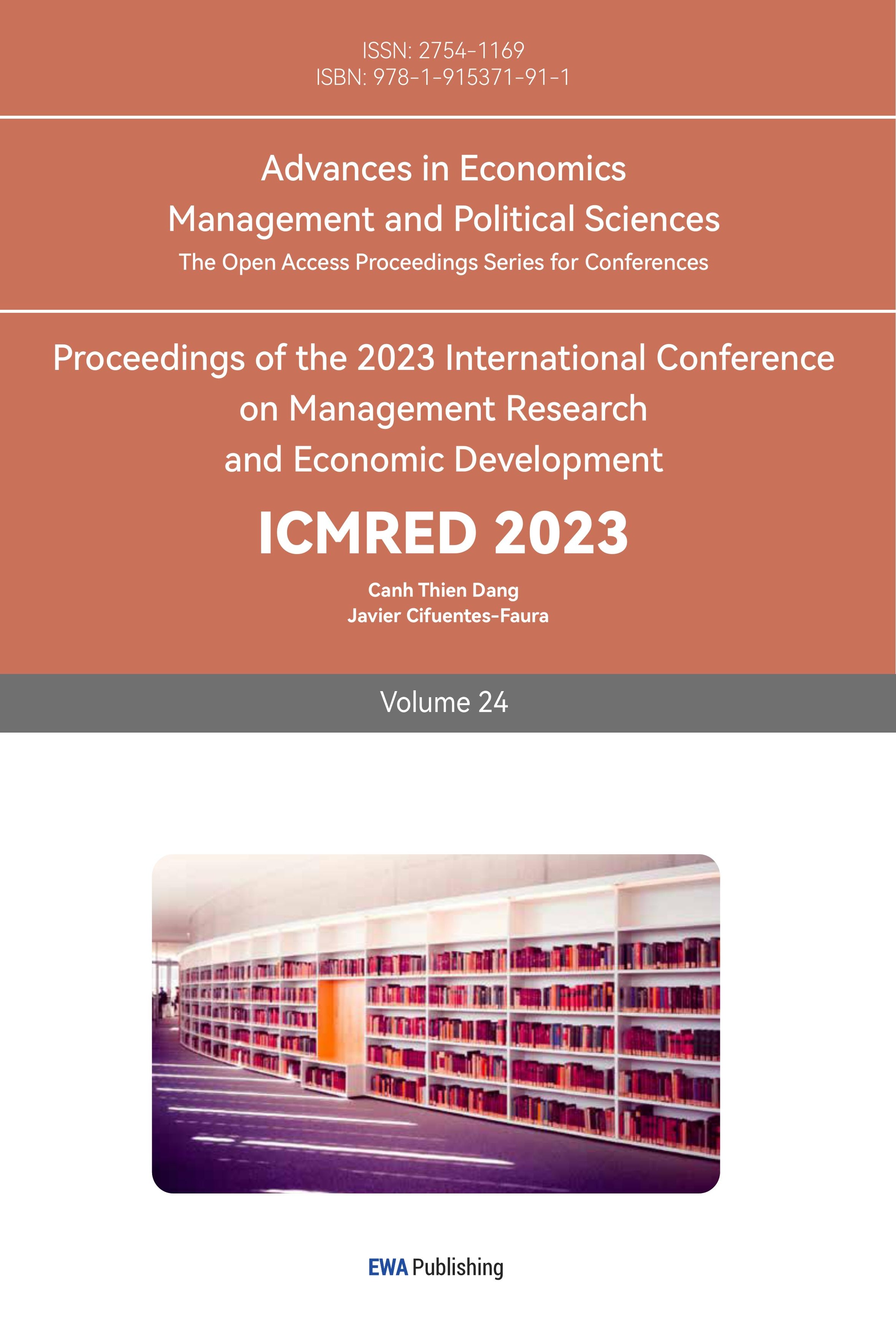References
[1]. Sujie Wang, Shanhong Qi.: Consumerism and High Consumption Behavior of Chinese Citizens in Outbound Tourism. Travel Journal 6, 39-44 (2005).
[2]. Zhihu, https://zhuanlan.zhihu.com/p/551064371,2022/8/8.
[3]. Hongmin Zhou.: Analysis of contemporary consumption characteristics and formation reasons. Chinese market journal 25, 44-47 (2013).
[4]. Thorstein Bunde.: The Theory of the Leisure Class-An Economic Study of Institutions. 2nd edn. Wuhan University Press, Wuhan (2014).
[5]. Woodside, A.G., E. Ko.: Luxury Fashion Theory, Culture, and Brand Marketing Strategy. Emerald Group Publishing Limited, London (2013).
[6]. Ger, G. , R. W. Belk.: Cross-cultural differences in materialism. Journal of Economic Psychology 17(1), 55-77(1996).
[7]. Baike.Baidu,https://baike.baidu.com/item/Hermes/4903817?fr=aladdin, last accessed 2022/12/09.
[8]. Zhihu, Looking at History from the Perspective of Consumption Iteration https://zhuanlan.zhihu.com/p/550316404, 2022/8/9.
[9]. Sohu, http://www.sohu.com/a/136748602_ 369526, 2017/11/24.
[10]. Yuan Yue.: Research on Chamel's marketing strategy in China,Shanghai International Studies University (2018).
Cite this article
Fang,J. (2023). Research on Multichannel Marketing of Ostentatious Products Based on Consumption Iteration Theory -- Take Hermes as an Example. Advances in Economics, Management and Political Sciences,24,381-387.
Data availability
The datasets used and/or analyzed during the current study will be available from the authors upon reasonable request.
Disclaimer/Publisher's Note
The statements, opinions and data contained in all publications are solely those of the individual author(s) and contributor(s) and not of EWA Publishing and/or the editor(s). EWA Publishing and/or the editor(s) disclaim responsibility for any injury to people or property resulting from any ideas, methods, instructions or products referred to in the content.
About volume
Volume title: Proceedings of the 2023 International Conference on Management Research and Economic Development
© 2024 by the author(s). Licensee EWA Publishing, Oxford, UK. This article is an open access article distributed under the terms and
conditions of the Creative Commons Attribution (CC BY) license. Authors who
publish this series agree to the following terms:
1. Authors retain copyright and grant the series right of first publication with the work simultaneously licensed under a Creative Commons
Attribution License that allows others to share the work with an acknowledgment of the work's authorship and initial publication in this
series.
2. Authors are able to enter into separate, additional contractual arrangements for the non-exclusive distribution of the series's published
version of the work (e.g., post it to an institutional repository or publish it in a book), with an acknowledgment of its initial
publication in this series.
3. Authors are permitted and encouraged to post their work online (e.g., in institutional repositories or on their website) prior to and
during the submission process, as it can lead to productive exchanges, as well as earlier and greater citation of published work (See
Open access policy for details).
References
[1]. Sujie Wang, Shanhong Qi.: Consumerism and High Consumption Behavior of Chinese Citizens in Outbound Tourism. Travel Journal 6, 39-44 (2005).
[2]. Zhihu, https://zhuanlan.zhihu.com/p/551064371,2022/8/8.
[3]. Hongmin Zhou.: Analysis of contemporary consumption characteristics and formation reasons. Chinese market journal 25, 44-47 (2013).
[4]. Thorstein Bunde.: The Theory of the Leisure Class-An Economic Study of Institutions. 2nd edn. Wuhan University Press, Wuhan (2014).
[5]. Woodside, A.G., E. Ko.: Luxury Fashion Theory, Culture, and Brand Marketing Strategy. Emerald Group Publishing Limited, London (2013).
[6]. Ger, G. , R. W. Belk.: Cross-cultural differences in materialism. Journal of Economic Psychology 17(1), 55-77(1996).
[7]. Baike.Baidu,https://baike.baidu.com/item/Hermes/4903817?fr=aladdin, last accessed 2022/12/09.
[8]. Zhihu, Looking at History from the Perspective of Consumption Iteration https://zhuanlan.zhihu.com/p/550316404, 2022/8/9.
[9]. Sohu, http://www.sohu.com/a/136748602_ 369526, 2017/11/24.
[10]. Yuan Yue.: Research on Chamel's marketing strategy in China,Shanghai International Studies University (2018).









